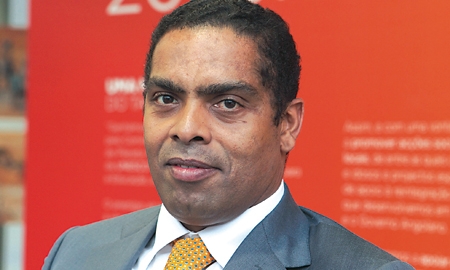
Banco Espirito Santo Angola, or BESA, is the Angolan unit of Portugal’s Banco Espirito Santo. The second biggest bank in the country, BESA is part of a multinational financial corporation with interests in Portugal, other parts of Europe and Brazil, in addition to Angola.
BESA prides itself on the quality of its service and its ability to give clients a wide range of financial services and products. By putting customers first, the bank has been able to grow steadily since it was founded, while winning new clients and benefiting from Angola’s recent economic growth.
The bank also believes strongly in giving back to the community. No bank can grow bigger and more profitable in a weak economy, and BESA makes a big effort to contribute to Angola’s improvement through investment, training and hiring, and through its environmental and community programs. “Our strategy has always been the same, and it rests on three pillars: profitability, social responsibility and supporting the economy of Angola,” says Alvaro Sobrinho, BESA’s CEO. “The tactics to apply that strategy can of course change,” as conditions evolve.
“Our strategy has always been the same: profitability, social responsibility and supporting the economy of Angola.” Alvaro Sobrinho, |
During the crisis the Central Bank maintained an expansionary monetary policy and also allowed currency to be sent abroad. In your opinion, what lessons can be drawn from the crisis?
I think we had a very restrictive monetary policy in recent years, and it was done well, with an increase in reserves and with a draining of liquidity from the market. Moreover, Angola’s ratio of reserves to GDP is among the highest in the world. Angola probably has a ratio of net international reserves to GDP at anywhere from 20 per cent to 25 per cent, when the average global figure is below 10 per cent. That clearly shows that a country like Angola has the capacity to borrow internationally by developing and diversifying its economy.
Analysts expect Angola’s financial sector to show strong growth this year. Do you agree with that outlook?
The growth of any sector, whether financial or otherwise, is possible only with economic growth. If Angola continues growing at positive real growth rates, as has happened in recent years, then obviously the financial sector will continue to grow too. The way I see it, there are no rich banks nor a strong financial sector with poor companies and citizens, it doesn’t happen that way. You also don’t get strong companies and a growing economy with weak banks. There’s a link between the growth of economic activity and the growth of financial institutions.
The Angola Stock Exchange is expected to open soon. What is your outlook regarding its competitiveness in Africa and its benefits for Angolan companies?
It will take a few years for the capital market to mature. The exchanges in South Africa and Egypt, for example, have been around for some years. It won’t become a strong market overnight. We do need to recognise that it’s an important step and a financing alternative to bank loans.
0 COMMENTS